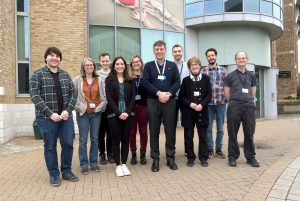Research led by the Centre for Cancer Immunology could help identify patients at risk of rapid progression and resistance to therapy in chronic lymphocytic leukaemia (CLL).

More than 6,000 people in the UK a year are diagnosed with CLL, a type of cancer of the B cells. B cells are part of the body’s immune system and are responsible for producing antibodies.
Previous research from the Southampton Cancer B-cell group has contributed to understanding the origin and behaviour of cancer B cells by analysing the structure and function of an antibody-like molecule on their surface, known as the B-cell receptor (BCR). Their work in CLL has contributed to the identification of the most aggressive subset of CLL and to the therapeutic targeting of their BCR by a new family of drugs, called BTK inhibitors (like ibrutinib), which are now the backbone of any treatment strategies in CLL patients.
In this new study, published in Blood Advances, an international team led by Professor Francesco Forconi has observed that the amount of BCR molecules on the leukaemic cells affects the ability of ibrutinib to block those signals required for the cancer CLL cells to survive and proliferate.
They found the CLL cells that have large amounts of BCR on their surface activate pathways bypass the blockade by ibrutinib, while those with small amounts of BCR do not. As a consequence, CLL with abundant BCR amounts progress more rapidly than those with low amounts in patients receiving ibrutinib therapy.
Their results identify the group of patients which will require therapeutic targeting by combined approaches.
Professor Forconi said: “This work is one of the very few currently identifying non-genetic mechanisms of resistance to BCR-associated inhibitors in CLL, and reinforces the known importance of the BCR in B-cell cancers and the need to refine strategies by further investigating this key molecule, ultimately keeping Southampton legacy in its track towards the improvement of care for patients with CLL and other B-cell cancers.”
The research was carried out alongside international partners of the ECRIN-M3 (Early Cancer Research initiative in monoclonal B-cell lymphocytosis), ERIC (European Research Initiative in CLL) and CIRU (Clinical Informatics Research Unit).
The work has been funded by the Keanu Eyles Fellowship awarded to Dr Chiodin and by Cancer Research UK charity. The findings were previously presented by Dr Giorgia Chiodin at the American Society of Hematology Conference and the international workshop on CLL in the previous years.